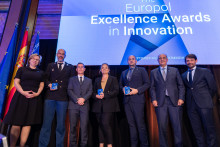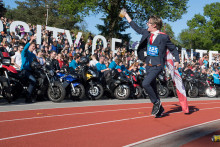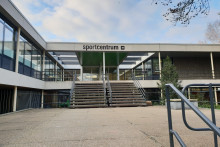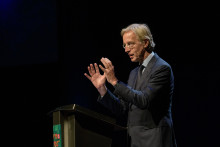Receiving the Europol award is a ‘huge deal’, says Böing, but the VR training could be considered a success regardless. More than 10.000 police officers in the Netherlands and Belgium have already received the training, with German police beginning to adopt it as well. And the results have been positive. ‘I have travelled the world and I tried many different interventions to mitigate ethnic profiling, but nothing else worked before.’
During the training, police officers put on VR goggles and are immersed in an interactive film set in a realistic scenario, such as on the streets of Rotterdam or during a covid protest in front of the Dutch parliament. ‘All officers are asked to engage with people and to detect criminal activity,’ explains Böing. ‘We see that some officers act based on their own bias, out of mistrust or based on the person’s ethnic background. For instance, they approach a group of non-Western looking boys who are just standing around, while instead they could focus on a man who appears to be a drug dealer.’
Sensitive topic
Which is precisely why Bas Böing came up with the idea for the training. ‘The project was initiated because we had a problem inside the Dutch police,’ he says. ‘Officers were accused of ethnic profiling and there was evidence to support these claims. This of course doesn’t apply to everyone, but some police officers tend to be overly confident when interacting with regular citizens, and they underestimate the impact their behaviour might have. They might feel like they don’t have to explain their actions. When they stop a person of colour, or a person of non-Western appearance, it can be problematic because they are sometimes not able to sufficiently explain why they did so.’
‘At the same time, discussing this with police officers and trying to train them on the topic is very difficult,’ continues Böing. ‘It is a sensitive subject and officers often don’t want to talk about it, because they feel attacked and accused of bad behaviour. They feel like they can’t do anything right. And so, as a result, they run away from training on unconscious bias and ethnic profiling – which impacts the operation of the police overall.’

Virtual reality to the rescue
And so, after years of work and research at the Dutch national police, Bas Böing had a thought: what if we could use VR to make the training more engaging and effective? ‘I was very eager to make it work,’ he says. After consulting with colleagues at the UT, he started his PhD research at the Psychology of Conflict, Risk and Safety group – while still working for the Dutch police. ‘My work and research overlap. This is very beneficial because I can immediately test the interventions I design. Everything I find effective goes directly to practice within the organisation.’
‘VR brings a sense of playing and experimenting’
Thanks to this arrangement, he’s already seen promising outcomes of his project. ‘I have tried everything, but VR is the only thing that’s worked!’ says Böing. ‘VR brings a sense of playing and experimenting. It lowers the officers’ resistance and helps them to collaborate with me. You create a very controlled, immersive and safe environment, which is so realistic that it allows the officers to make the same decisions as they would in the real world. Thanks to that, you can hold them accountable for their actions and openly discuss why they did certain things. Officers have said that the training resonated with them for a long time.’
About Bas Böing
Bas Böing is a program manager for the Dutch police, working on programs in the field of social justice, curbing racism and ethnic profiling in particular. He is also a PhD researcher at the Faculty of Behavioural, Management and Social Sciences (BMS) of the University of Twente, where he investigates the participation of police officers around the subject of ethnic profiling and how virtual reality can play a role in mitigating ethnic profiling.
His project ‘VR Surveillance’ won the 2023 Europol Excellence Awards in Innovation in the category for innovative initiatives in Ethics, Diversity and Inclusion. The award was handed out on the 26th of September during the annual European Police Chief Convention in The Hague.
More to come
Winning the Europol award will provide an additional boost to the project, believes Böing. ‘There were law enforcement representatives from all over the world in the audience –the FBI, Germany, New Zealand, you name it. It’s a highly recognized award, globally. It provides recognition for the hard work and leads to more budget for the project – and therefore to more impact in real life. Because even though we already trained thousands of people, we still need to train about 40.000 officers in the Netherlands alone. For this, we need resources which is why receiving the award is a big help.’
Although the current version of the training works well, Böing aims to develop it further. ‘We hope to make it even more interactive, possibly using AI, so that we can train more officers at the same time. We are now also beginning to experiment with using deepfakes in order to quickly change the appearance of a person in the video. For example, if officers see a white guy on a motorcycle in the banking district in Amsterdam, they are likely to assume that he is a banker or a lawyer on his way to work. However, if we change the skin colour of the man, he might suddenly appear to be a possible drug dealer. This is something that needs to be openly discussed and addressed.’
'I want to contribute to fair and effective policing’
The policeman and UT researcher is on a mission to combat racial profiling, he says. ‘Police work doesn’t stop at the borders. I have travelled to countries and have heard police officers justifying their stops and searches. In some cases, there was a just cause, while in others they were acting unlawfully or unethically. This eventually undermines the legitimacy of the police. Therefore, we need to be a democratic police force, and my mission is to uphold these democratic values all over the world. I want to contribute to fair and effective policing. Police cannot be effective without being fair.’







